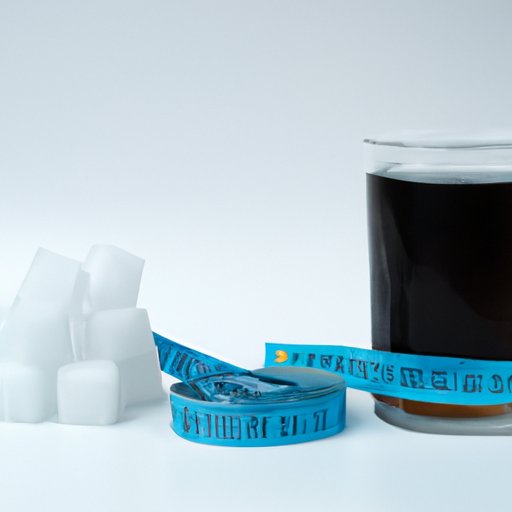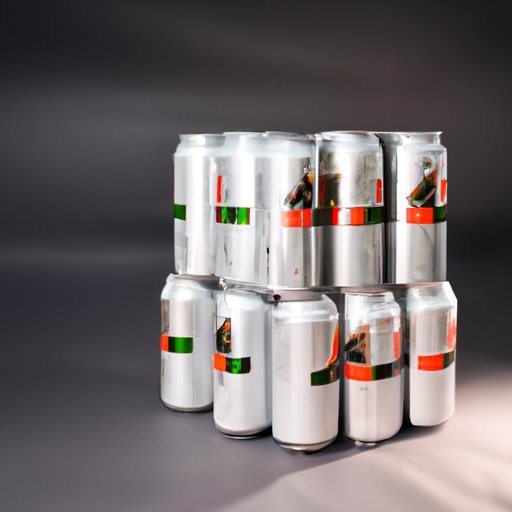
Introduction
Diet soda has long been a popular beverage choice for people looking to lose weight or reduce their sugar intake. Marketed as a healthier alternative to regular soda, diet soda is often thought of as a weight loss tool. However, recent research has called into question whether or not diet soda is actually helpful for weight loss, and whether it is even safe to consume. In this article, we’ll explore the science behind diet soda and weight loss, debunk commonly held myths, examine the negative effects of diet soda, and offer practical alternatives and strategies for successful weight loss.
The Science Behind Diet Soda and Weight Loss: Exploring the Research
Diet soda is a low- or no-calorie carbonated drink that is primarily sweetened with artificial sweeteners such as sucralose, aspartame, or saccharin. Some of the research around diet soda and weight loss has been promising. A study published in the Journal of the American College of Nutrition found that participants who drank diet soda lost more weight than those who didn’t drink any soda at all. Another study published in Obesity Research found that individuals who replaced sugary beverages with diet soda experienced weight loss and improvements in insulin sensitivity.
However, other studies have shown that diet soda may not always lead to weight loss, and can actually have the opposite effect. One study published in the American Journal of Public Health found that people who drank diet soda had higher rates of abdominal obesity and weight gain over time compared to non-diet soda drinkers. Another study published in the Journal of the Academy of Nutrition and Dietetics found that diet soda consumption was associated with an increased risk of metabolic syndrome, a cluster of health conditions that can contribute to heart disease and type 2 diabetes.
Debunking the Myth: Why Diet Soda Doesn’t Always Equal Weight Loss
One reason why diet soda may not be effective for weight loss is due to marketing tactics that can be misleading. Many people believe that simply swapping regular soda for diet soda will lead to automatic weight loss. However, other factors such as exercise, sleep, and stress can also play a significant role in weight gain or loss. Additionally, drinking diet soda may actually increase cravings for other sweet foods, leading to overconsumption of calories.
Furthermore, people who consume large amounts of diet soda may believe that they have more leeway with their food intake. For example, someone may order a large pizza because they believe that they saved calories by drinking diet soda instead of regular soda. This type of thinking can lead to overeating and weight gain despite drinking a low-calorie beverage.
Hidden Dangers: The Negative Effects of Diet Soda on Your Health and Weight Loss Goals
While many people believe that diet soda is a healthier option than regular soda, it can actually have negative effects on both weight loss efforts and overall health. For example, some studies have suggested that consuming artificial sweeteners like those found in diet soda may lead to a higher risk of type 2 diabetes, metabolic syndrome, and even liver damage.
Additionally, diet soda consumption can impact gut health and digestion. Many artificial sweeteners cannot be broken down by the body, which means they pass through the digestive system largely intact. This can cause imbalances in gut bacteria, leading to inflammation and digestive issues that can hinder weight loss efforts. Additionally, drinking diet soda can contribute to dehydration, which can make it more difficult for the body to burn fat and lose weight.
Options for a Healthier Beverage: Alternatives to Diet Soda for Successful Weight Loss
If you’re looking for healthier beverage options for weight loss, there are plenty of alternatives to diet soda. Water is always a great choice, as it hydrates the body and helps flush out toxins. Unsweetened tea or coffee can also be good choices, as long as you watch how much cream or sugar you add. You can also try adding fresh fruit or herbs to your water for added flavor without the added sugar.
It’s also important to pay attention to what you’re drinking throughout the day. Many people consume a lot of liquid calories without even realizing it, such as in the form of sugary coffee drinks or sports drinks. By being mindful of what you’re drinking, you can make smarter choices that will support your weight loss goals.
Mindful Consumption: Strategies for Incorporating Diet Soda into a Balanced Diet and Weight Loss Plan
If you do decide to continue drinking diet soda, there are ways to do so without sabotaging your weight loss efforts. The key is to be mindful of your consumption and set limits on how much you drink. For example, you might limit yourself to one diet soda per day, or only drink it on certain days of the week. You can also try drinking diet soda alongside healthy foods, such as a piece of fruit or a serving of vegetables, to help balance out your overall calorie intake.

The Role of Diet Soda in a Weight Loss Journey: Personal Perspectives and Success Stories
While diet soda may not be an ideal weight loss tool for everyone, some people have successfully lost weight while still including it in their diet. For example, some people find that drinking diet soda in the afternoon helps them avoid unhealthy snacks later in the day. Others enjoy the taste of diet soda and find that it helps them stick to their overall healthy eating plan.
The key is to approach diet soda with a balanced and mindful perspective. Recognize that it is not a magic weight loss tool, but that it can still be a part of a balanced diet and lifestyle. By being aware of how much you’re drinking and making smart beverage choices throughout the day, you can support your weight loss goals while still enjoying the occasional diet soda.
Sugar vs. Artificial Sweeteners: Weighing the Pros and Cons for Weight Loss and Overall Health
The debate around sugar versus artificial sweeteners can be confusing, especially when it comes to weight loss. While some studies suggest that consuming large amounts of sugar can lead to weight gain and other health issues, other studies have raised concerns about the potential risks associated with artificial sweeteners. Ultimately, the best approach is to consume both sugar and artificial sweeteners in moderation, and to make informed decisions based on your own individual health needs and goals.
Conclusion
In conclusion, while diet soda may seem like a healthy choice for weight loss, the reality is that it can have negative effects on both weight loss efforts and overall health. However, by being mindful of your consumption and making smart beverage choices throughout the day, you can still incorporate diet soda into a balanced and healthy diet and lifestyle. The key is to focus on whole, nutrient-dense foods, maintain a healthy calorie deficit, and approach weight loss with a balanced and realistic perspective.




